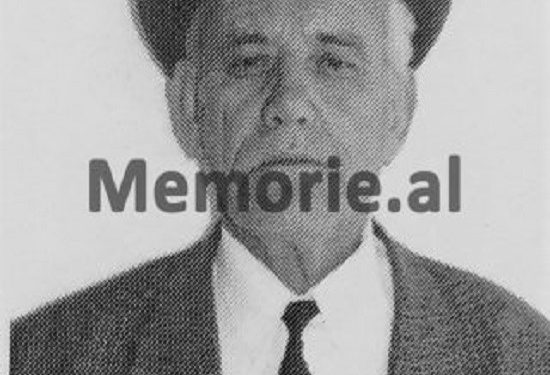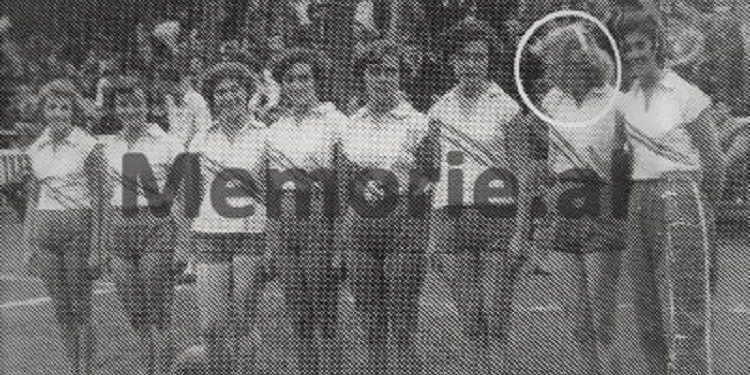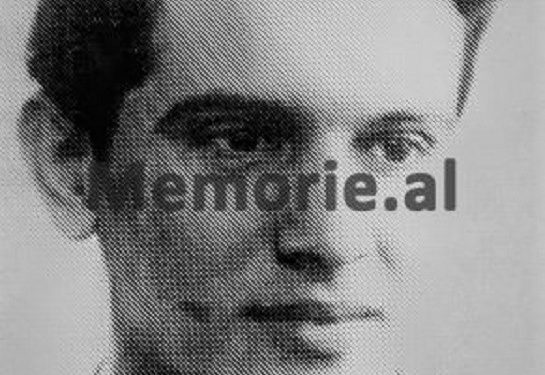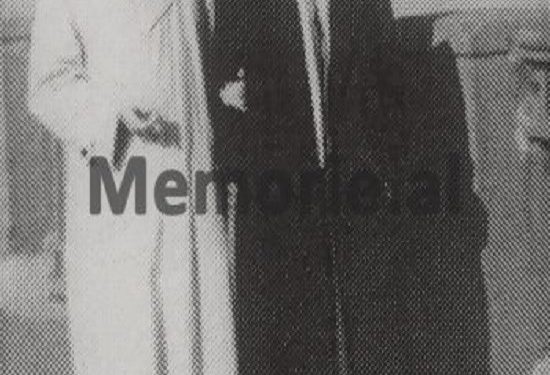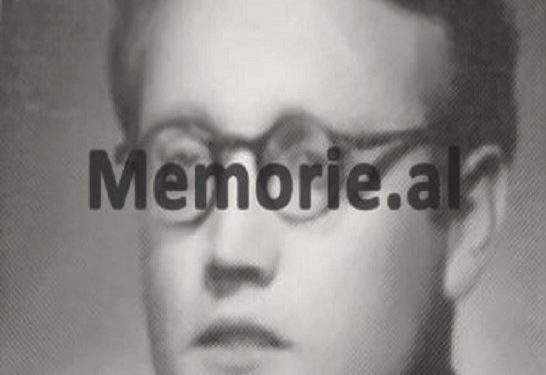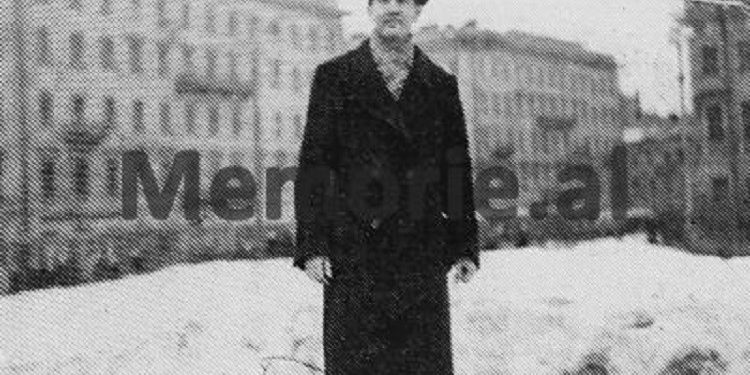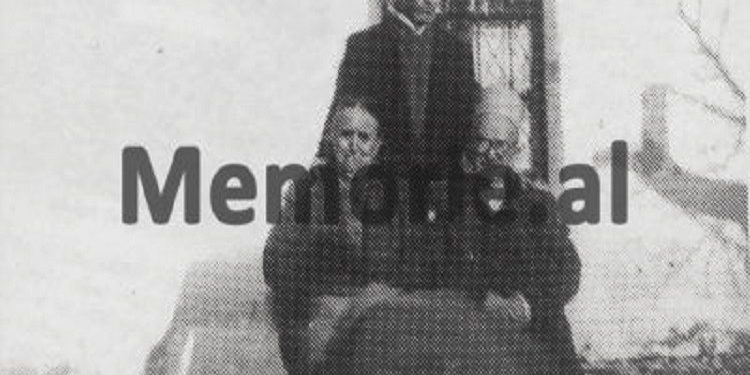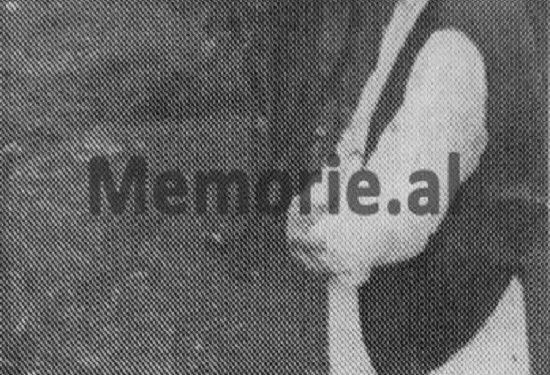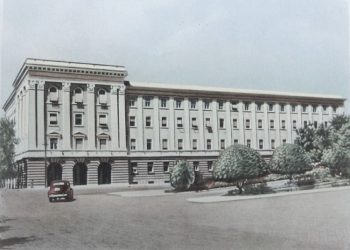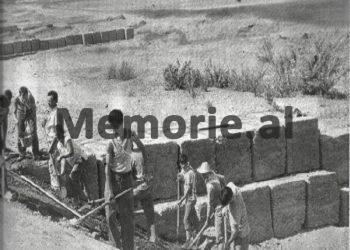Dashnor Kaloçi
Memorie.al publishes the unknown story of the tyrannical Sallaku family, which during the occupation of the country (1939-1944) became an important base of illegal Communists, where its three sons were in partisan formations and as a result of their contribution. Great that that family gave up on the Anti-Fascist War, after 1944, the seven children of the Sallaku family (five brothers and two sisters) were educated at universities inside and outside the country.
Muhamet Sallaku’s rare testimony of the tragedy of that family that began with the break-up of Communist Albania’s official relations with the Soviet Union and its other Eastern European satellite countries in 1961, when the three Sallaku brothers: Nuriut, Javit, and Muhammad, they were pressured to divorce their Czech and Russian wives, who subsequently fled to their homeland.
Attempted escape of Nuri and Abdullah in 1963 and their sentencing to 25 years in prison, only released in 1990 and the tragic death of Javit in the cells of the State Security investigation, after being arrested in 1975 by was accused of being “an agent and collaborator of the sabotage group headed by Abdyl Kellezin”, while his other brother, Hamdiu, a former secretary of Enver Hoxha, worked as a journalist for “Voice of the People” …?!
“After 1960, when Albania severed official relations with the Soviet Union and other Eastern European countries, I, with my brothers, Nuri and Javit, who had studied in Moscow and Prague, did not expect the policy of separation from the Socialist Camp that the Labor Party and Enver Hoxha were attending. This was not only due to our formation with the liberal spirit Khrushchev had pursued in those years we studied in the Soviet Union, but also because I had married Javit with Russian girls, and Nuri with a Czech girl from Prague. Although our brother Hamdi, who graduated from Moscow’s “Lomonosov”, was a secretary of Enver Hoxha, the frustration of the communist regime increased with our other brothers. This began in the late 1960s, following the forced departure of my wife, Nina, with son Fatosin in Moscow, and the division of Nuri with his wife Vlastan, who remained in Prague. All these dramas we experienced as brothers with family breakdowns forced Nuri and his younger brother, Abdullai, who at the time worked as a journalist with the Albanian Telegraphic Agency, to make their way to the border to escape abroad. . But they were apprehended at the border along with five other comrades as they were crossing the clone in the Pogradec area, and during the trial in Tirana, Abdullai took a very harsh attitude towards the communist regime. He said ignorance prevailed in senior leadership. After Nuri and Abdullah were arrested, though we were asked to deny them as brothers, we as a family did not. Only the other brother, Hamdi, who had graduated from Lomonosov in Moscow and worked as Enver Hoxha’s secretary, was forced to act as ordered. So remembers Muhamet Sallaku, an engineer in the former Soviet Union, all the tragic story of his family, where two brothers Nuriu and Abdullai suffered 25 years in communist regime prison, while another brother, Javit, died from torture in State Security cells, accused of being “an agent and accomplice to Deputy Prime Minister Abdyl Këllezi and the sabotage group in the Economy”. Who were the Sallaku brothers and when did their dissatisfaction with the Hoxha communist regime begin and why did they decide to leave Albania? How were they caught on the border and standing during court hearings? How was the Sallaku family treated after Nuri’s and Abdullah’s conviction, and why was his other brother Hamdi, who worked as Enver Hoxha’s secretary, not fired?
How did the disintegration of the Sallaku brothers begin with the regime?
How did the dissolution of the Sallaku brothers begin with Enver Hoxha’s communist regime, and when did they begin to feel dissatisfaction with the ideal for which they had been sacrificed since the war when they were partisans? In this connection, among other things Muhamet Sallaku testifies: “Our home during the War had served as the base of the Communists and the three brothers were participants in this war. Whereas after the end of the War, in 1948, our brother Mahmud was arrested, as he collected 300 signatures to protect his close friend, Prof. Dr. Locin, the Italian physician who remained in Albania since the war, who had been arrested and sentenced to death by the Supreme Court. Following the sentencing of Kochi Xoxes, Mahmud was released from prison and stabilized at the Civil Hospital. Also, another blow from the communist regime was the tragic death of our aunt’s daughter, Hatlie Tafani, who was thrown from the balcony of the Investigator (former Barricade Street War Museum). Hatlia had been a partisan and in 1946, she was appointed secretary at our Embassy in Belgrade. She declined to go, telling them she did not have the education needed for the task and was unmarried. After being refused, he was arrested and unable to endure torture, jumped out of the Investigator’s balcony to end his life. Whereas in 1960-61, with the disruption of official relations with the Soviet Union and other Eastern countries, where our four brothers had completed their studies, we had graduated, we felt very much about it and it increased our dissatisfaction because we were married and had Russian and Czech women ”, recalls Muhamet Sallaku regarding the first vicissitudes of their family after the communist regime came into power.
The Sallaku brothers, with Russian and Czech wives
After 1960-’61, when Enver Hoxha finally severed Albania’s relations with the Soviet Union and other Eastern countries, most of those students who had studied in these countries and married there were forced under pressure. and separated the wives, who returned to their homelands. This created a lot of discontent at the time because most of them were left without children, who took their wives who returned mainly to the Soviet Union, Hungary, Poland, the Czech Republic, and Romania. One of these families affected by the plague was the Sallaku family, where her three sons were married to foreign girls. Regarding this, Muhamet recalls: “When I was studying in the Soviet Union, I met a Moscow girl named Nina, whom I married in Tirana in 1955, and she finished her final year at the Faculty of Medicine here in Tirana. After a year we were raised with a boy, whom we named Fatos. The other two brothers, Xhavit and Nuri, also married Russian and Czech girls. Xhavit was married in Leningrad in 1954 when he was studying and his wife was named Irina Bubir, while Nuri was married in Czechoslovakia to a Prague girl named Vlasta Faltisova. Vlasta was the only girl and Nuri lived in her house while studying in Prague, ”recalls Muhamet, who faced the setbacks he and two other brothers faced in 1961 when official Tirana cut ties with the Soviet Union and other countries. its other communist satellite, in Eastern Europe.
Forced separation from Russian and Czech wives
By the end of 1961, according to the guidelines of the Central Committee of the ASP, all former students who had studied in Eastern European countries and married foreign girls were pressured and asked to ‘divorced them. Most of them shared with their wives and why they had children with them. This “fate” was also enjoyed by the Sallaku brothers, who had graduated from the Soviet Union and the Czech Republic. Regarding the drama of the breakup of their families, Muhamet Sallaku relates: “In the late 1960s, I was called to the party organization I was part of, and I was asked to separate from my Russian wife, Nina, whom we had married in Tirana in 1955 and we had a son from this marriage. I initially refused to do so, but the pressures were numerous and there was no other way: either to break up or to go to prison. After completing her final year of Medicine, Nina worked as a physician in Tirana and became active with the Student’s Volleyball team along with her friend, the renowned physician, Dr. Rushen Golemi. Seeing that we had no other way, in the late 1960s, Nina took her son, Fatos, and eventually left Albania, returning to the Soviet Union in her homeland. She left for postgraduate studies in Moscow, but we were clear that we would not be able to reunite again. At the same time, another brother, Nuriu, who was married when he was a student in Prague, split with Czech national Vlasta Faltisova. Vlasta had come to Tirana only once for a vacation, and after pressure from Nuri, he was unable to invite her to Tirana, as he had promised Vlastava. Unlike me and Nuri, Xhavit’s other brother, he was allowed to keep his Russian wife, Irina Bubir, as they had two twin daughters (Vera and Elena). After that, Irina worked for many years as a surveyor in the Ministry of Construction, ”recalls Muhamet, who divorced his two brothers from foreign wives.
The year 1965, Nuriu and Abdullai, caught at the border…
After the forced separation with their wives and the breakup of their families, the Sallaku brothers became even more averse to Enver Hoxha’s communist regime. Regarding this fact, Muhamet recalls: “The breakdown of Albania’s relations with the Soviet Union, I greatly felt with Javit and Nuri we had studied in these countries. This was not only because of our formation with the liberal spirit that Nikita Khrushchev had pursued in those years we studied there, but also because we were separated from our Russian and Czech wives. Although our brother Hamdi, at this time working as Enver Hoxha’s secretary, we were openly expressing discontent, not only as brothers in our family but also in the community. All of this drama that we experienced as brothers forced Nuri and Abdullah, who was working as a journalist at Radio Tirana at the time, to make their way to the border to escape abroad. Their plan of escape was only known to me since at first we agreed to escape with me and them. But then the plan changed, that they begged me to stay with my parents at home. The bullets with Nuri were caught near the clone in the Pogradec area, along with their friends: Astrit Muca, Nevruz Serezi, Muhamet Kosovrasti, and two others I can’t remember the names of. Their capture and arrest occurred as they returned to pick up Nuri who was unable to walk because they had dropped their glasses. Their trial took place at the end of 1965 in Tirana and there Abdullai took a very harsh stance, saying that: the communist regime of Tirana was being violently held and the preponderance of senior leadership ignorance prevailed. When asked to explain the violence, Dulla said: ‘Not to go any further, I tell you that you are killing your former partisan friends who have fought together.’ While Nuriu took a softer stance and did not get into politics, he stated that he had wanted to flee to join his wife in Prague. Dulla was initially sentenced to death but was subsequently sentenced to 18 years in prison, and Nuriu was sentenced to 16 years. After the brothers’ arrest and conviction, we were taken home by the State Security men who, after seizing some documents, pressured us to deny our brothers imprisoned. We refused to deny the brothers, with the exception of Hmdi, who at that time was secretary of Enver Hoxha, and was obliged to do as he was ordered. When Dulla and Nuri were arrested, Hmdiu, who was Secretary of the Party Organization in the Central Committee of the APL, came up to the meeting and was told that he could no longer work in that capacity with two imprisoned brothers, as the people would speak. But though Enver Hoxha wanted to keep saying that every man had his head on his shoulder, Hamdi refused to work. After that, he was taken to the Voice of the People newspaper and then to the local Adriatic newspaper in Durres, ”recalls Muhamet, in connection with the sentencing of his two brothers who attempted to flee.
The year 1976, Xhavit’s death in the cell
While Nuri and Abdullai were serving sentences in the prisons of the Communist regime as “enemies of the people”, Hamdi worked as a Voice of the People journalist, Javit as deputy chairman of the Tirana Executive Committee, and Muhamet as an engineer at the Mechanical-Geological Plant in Tirana. Although the communist regime seemed to have “washed away” with the Sallaku brothers, giving everyone their well-deserved revenge, the “pact” between them turned out to be false, as in 1976 another brother Javit was arrested. Related to this, Muhamet relates: “After the conviction of Abdullah and Nuri, Javit was removed from the Executive Committee of Tirana where he was Vice-President of Abdyl Kellezi and after being sent to the Textile Combine in Berat for some time, he was brought to the Ministry of Construction. That was where he was appointed Director of Construction and Installation of the Ballsh Oil Treatment Plant. Javit worked diligently on that large shipyard until 1976 when he was arrested, accused of being “an agent and associate of Abdyl Kellez and the Sabotage Group in Economics”. After his arrest, Russian woman Irina Bubir, along with her two twin daughters who were expelled from the University, were interned in the village of Ezeqa in Fier. They did not allow her to meet her father, Javit, who died in the Torture Investigator, four months after his arrest. We as a family never learned the truth of his death in the cell. After long internment in the villages of Fier in 1988, Javit’s wife, Irina, along with her two twin daughters, petitioned the People’s Assembly and Ramiz Alia to return Russian citizenship and allow him to leave Albania for in the Soviet Union. Her request was approved within 24 hours and immediately Irina and her two daughters (Vera and Elena) left Albania and settled in Leningrad”.
Meeting wives after 30 years
After the tragic death of Xhavit Sallaku in the darkened cells of the State Security, his two other brothers, Nuriu and Abdullah, continued to serve their sentence in the prisons of the Communist regime. Concerning this, Muhammad recalls: “After the death of Xhavit, all the burden of taking care of the two imprisoned brothers fell upon me. My mother and I kept in touch with the imprisoned brothers and went to meet them in prison camps where they could afford. Abdullah served his entire sentence, serving 25 years in the Burrel Prison, while Nuriu served 24 years and eight months. In July 1990, when the embassies were opened, Abdullai joined the German embassy and was able to move to Germany. There he married an Albanian and raised his family where he still lives today as a political immigrant. The other brother, Nuriu, left Albania two or three years after Abdullah and went to Prague where he met his ex-wife Vlasta. She was married after losing hopes that she would one day meet her Albanian husband. Vlasta intermarried and married Nuri to a relative and their two families live in Prague. So, too, after the ’90s, through my Javit wife Irina, who had moved to the Soviet Union in 1988, I became connected with my ex-wife Nina. After communicating over the phone, in 1993 I went to Moscow and met Nina and son Fatos, with whom I had been separated when he was only four, and met him when he was 36. Nina, after completing her postgraduate studies in Moscow, had worked as a doctor, while Fatos, my son, graduated in Economics and did business. Even though I was married, I still keep in touch with my ex-Russian wife and my son Fatos. Irina Bubir’s brother’s wife, Javit, with their two daughters Summer and Elena, has decided and will come to live in Albania permanently. They made this decision in remembrance of their father, that the Albanian state has not yet found the bones, ”concludes his family’s tragic story.
The Sallaku family and their first, Ymeri, who opened the Agricultural Bank in Tirana in 1908
The Sallaku family is of autochthonous tyrannical origin, and until 1933 they lived in a house located in a narrow alley near the “Nana Queen” School, where the “Renaissance Workers” Street begins today. The grandfather of the Sallaku brothers called Mahmut, and after returning from Turkey where he completed a Pedagogical School, served as a private tutor to the large family, Toptani, teaching their children. From Mahmut Sallaku’s great friendship with the Toptanas and in gratitude for the great help he had given their children in writing and singing, they took his son, Ymer (the father of the Sallaku brothers), whom he they grew up and gave them homes in their own sarajas, where he married and started a family. Under the auspices of the Toptans, Ymer Sallaku graduated from Turkish Civic School in 1908, and in that year, together with Ibrahim Hafiz Dalliu, he began to teach secretly Albanian language to tyrannical families. After 1908, Ymer Sallaku, together with Refik and Murat Toptani, made a request to the Istanbul High Gate that a percentage of the taxes levied on the villagers be saved and deposited in an Agricultural Bank, which they undertook to establish. in Albania. Their request was accepted by the government at that time, and at that time, Ymer Sallaku, besides teaching the Albanian language which he continued for many years, took over and established the First Agricultural Bank in Albania. The agricultural bank that Ymeri founded and worked for several years as its head, after 1920, was transformed into the National Bank of the Albanian State. After the death of the first woman with whom Ymer had three children, he remarried to a daughter from Paskuqan (daughter of Haji Kurti) and by that marriage, he had five sons and two daughters: Iqbal (d. 1924), Hamdi (1925), Nuri (1927), Javit (1929), Muhammad (1931), (Mahmudia) 1933, Abdullah (1936). Following the proclamation of the Albanian Kingdom in 1928, King Zog appointed Ymer Sallaku to the post of Chairman of the State Budget Control Council, where he also handled the salaries and control of senior officials. In that capacity, Ymer worked until his retirement in 1933 and throughout his life, he never engaged in politics, except in late 1912, when his close friend, Refik Toptani, appointed him to formulate various press releases of Ismail Qemali’s government. Likewise, after the declaration of independence, Ymer participated in the Reci War in the outskirts of Shkodra, when hundreds of tyrannical volunteers went. During the War years (1939-1844), the house of Ymer Sallaku, which is still located at Selvija today (bought by him in 1931), became one of the important bases of the Communists, housing illegals and collecting aid for partisans. Three of the Sallaku brothers (Hamdi, Nuri, and Mahmud) emerged partisans. Hamdi worked with the press and propaganda of the Albanian Communist Party, Mahmoud in Dajti’s gang, Nuriu in the Third Attack Brigade, and Muhammed worked with DEBATIK groups. As a result of her family’s contribution during the war, all five of Sallaku’s brothers and sisters were educated and graduated from universities in and outside Albania. After the war, his older sister, Iqbal, worked as a teacher, Mahmoud, (Imer’s son with his first wife), worked in the Economic Section of the Tirana Executive Committee, while Hamdi, Javit, and Muhammad continued their studies in the former Union. Soviet. Hamdi graduated in 1954 from the Faculty of Philology at Lomonosov University, Javit (also in 1954), in Leningrad, in Civil Engineering and Muhammed in 1955, at the Moscow Petroleum Institute. After them in 1957, Nuriu went to Prague where he studied medicine and after breaking the relations of Albania with the Socialist campsites, he came and graduated in Tirana in 1962. The only of the brothers who studied in Tirana was more their youngest, Abdullai, who graduated from the Faculty of Philology in Tirana in 1959. After graduating from high school, Hamdi was appointed Enver Hoxha’s secretary (in the office of letters), Nuriu as a physician at the Hospital Civil, Xhaviti at the Ministry of Construction, Muhamet at the Geological Plant in Tirana and Abdullai as a journalist at the Albanian Telegraphic Agency and Radio Tirana. Following the conviction of Nuri and Abdullaiot in 1965, Javit was arrested in 1976 (former Vice President of the Tirana Executive Committee working as Head of the Construction and Assembly of the Ballsh Deep Oil Refinery, accused of being an “agent”). and an accomplice to Abdyl Kellezli’s group of saboteurs in Economics. ”Javit died of torture during an investigation in May 1977, and his wife (Irina Bybir) of Russia with her two daughters was interned in Sheq-Marinëz, Fier. with Abdullah suffered 25 years in the regime’s prisons and released in 1989 and 1990, all of their fanboys (except Hamdi), suffered the isolation and the horrific class struggle. Memorie.al




